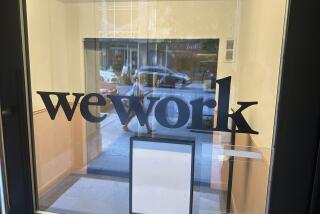Loss of $126.4 Million Reported for 1986 by Westworld Healthcare
- Share via
Westworld Community Healthcare Inc. said Monday that it lost $126.4 million during 1986, with the bulk of that loss coming in the form of writedowns taken in its attempt to stave off bankruptcy through a mammoth restructuring.
The staggering loss compares with the record profit of $3.5 million that the Lake Forest hospital operator reported for 1985. Of the 1986 loss, $89 million was in fourth-quarter write-downs on facilities to be divested, said Glenn Caster, a Westworld vice president.
For the final quarter of 1986, Westworld reported a $124.6-million net loss, which contrasted with an $882,000 net profit the year before.
The writedown underscores the cost of the expansion binge in which 5-year-old Westworld swelled to 38 hospitals and 133 clinics in 15 states by early 1986. Today, Westworld runs just 16 hospitals and 40 clinics in eight states and plans to divest additional operations.
Despite the loss, revenue increased 40% during 1986 to $187 million from $133.2 million in 1985. Fourth-quarter revenue fell 6% to $38.3 million from $40.9 million.
Caster blamed the fourth-quarter revenue drop on the reduction in hospitals that Westworld operated during the period.
Two weeks ago Westworld said that because of poor operations during January it would get rid of several more money-losing hospitals this year, either by transferring management contracts to other companies or by turning the facilities over to local authorities.
Westworld specialized in operating small, rural hospitals that generally had been burdensome to the local governments that owned the facilities. The company either acquired the hospitals for a token fee or obtained cheap, long-term contracts to run them.
Faced Boycotts
However, because of what Westworld officials later acknowledged was an arrogant policy of charging more than the market would bear in many areas, local residents often boycotted Westworld hospitals.
In one case, Westworld charged a patient at a hospital it operated in Missouri $19 for a single Tylenol tablet so his bill would reach the $1,050-a-day rate it had targeted for all patients. Eventually, Westworld became the target of a pair of civil lawsuits brought by the Missouri attorney general, who accused the company of violating that state’s anti-fraud laws.
Adding to Westworld’s woes was an unusual billing system scrapped earlier this year that was patterned after Medicare’s “diagnosis-related group” system. Unlike traditional hospital billing systems, the Westworld system, instituted last year, charged a fixed amount based on a patient’s aliment, not on services rendered.
In January, after company founder Mike Dunn resigned as chairman and chief executive, Westworld dumped the billing system. Because it irritated patients and confounded insurers, the system helped to damage cash flow at a time when Westworld was trying to cope with declining Medicare reimbursements and depressed economies in many rural areas.
“Mike really wanted to sell the billing system,” Caster said in an interview Monday. “There were some of us here at the company who felt that the billing system wasn’t worth defending.”
Perhaps Westworld’s biggest problem was its massive debt, which included $65 million in high-yield junk bonds underwritten by Drexel Burnham Lambert. The debt became impossible to service after Westworld’s misfortunes began to multiply. In all, interest expenses totaled a crippling $13.7 million during 1986, Caster said.
In Default on Payment
Since the beginning of December, the company has been in default on a $2.5-million interest payment due on $35 million in subordinated debentures. On April 1, a $2.2-million payment on $30 million in subordinated notes becomes due.
Westworld now is attempting to exchange its existing bond debt for new debentures that would have lower interest rates and whose holders could be paid off in stock. Westworld had set last Tuesday as the deadline for the swap but extended the offer to this Friday.
Caster said Monday that the bond swap is a “key component” in Westworld’s bid for survival. Company officials are optimistic that the swap can be executed, but Caster admitted that a Chapter 11 bankruptcy will “loom up as a much stronger possibility” if the offer fails.
“I’m surprised that the company is still around and I can’t see how it will avert going into Chapter 11,” said Stephen Reid, health-care analyst for Los Angeles firm of Wedbush Securities Inc. “It’s been a mismanaged company, and this is a tough enough business with good management.”
A favorite of Wall Street even into early 1986, Westworld’s rapid deterioration has been especially hard on investors who have seen the value of their holdings in Westworld virtually evaporate during the last year.
Westworld stock, which traded as high as $15.375 a share in 1986, fell to new lows as the company’s situation worsened. Dropped from the NASDAQ automated quotation system last month, Westworld stock was quoted at a bid price of only 50 cents a share on Monday.
NASDAQ officials said Westworld was dropped because the company’s net worth had fallen below the $375,000 minimum required to remain part of the system.
More to Read
Inside the business of entertainment
The Wide Shot brings you news, analysis and insights on everything from streaming wars to production — and what it all means for the future.
You may occasionally receive promotional content from the Los Angeles Times.










